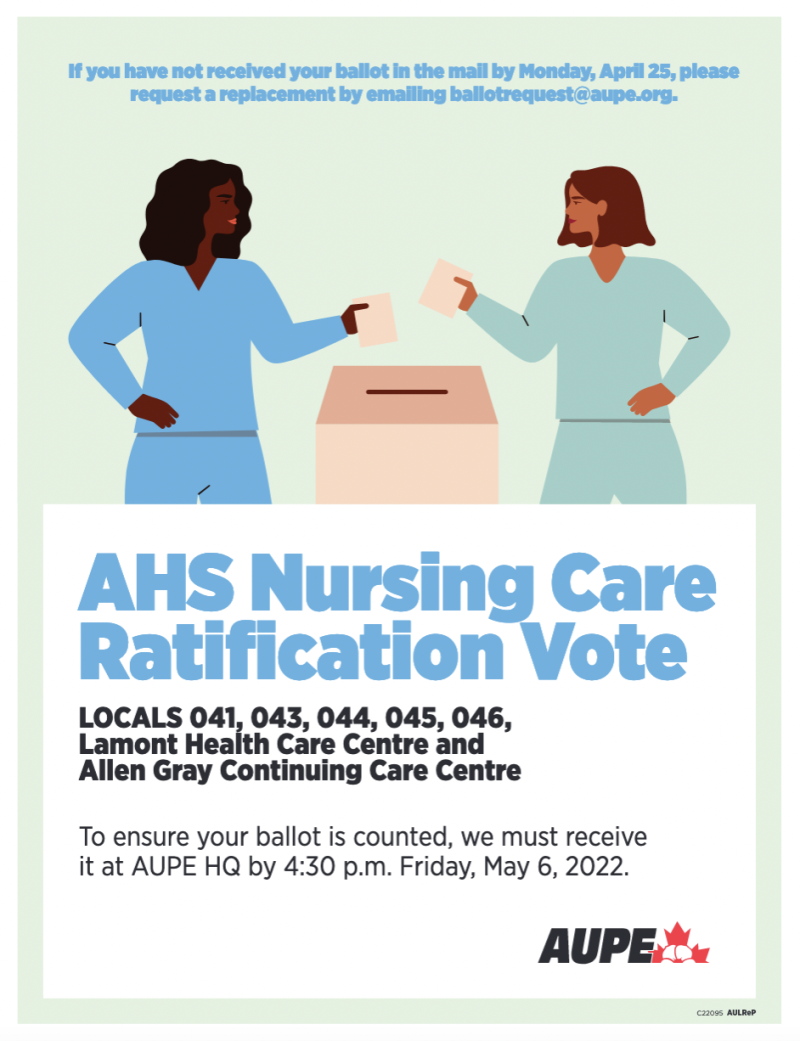AHS Nursing Care Negotiating Team Holds Successful Virtual Town Halls
Your AHS Nursing Care Negotiating Team held three town halls this week; here’s a list of the most frequently asked questions – and answers
Apr 16, 2022
Here’s a list of the most frequently asked questions – and answers

Your AHS Nursing Care Negotiating Team held three town halls this week, with 1,375 members calling in on April 12 at 5:00 p.m., 983 on April 13th at noon, and 1,202 that same day at 5:00 p.m.
We heard your concerns about scheduling events to accommodate members working 12-hour shifts and encourage you to visit AUPE’s facebook page where you can view the town halls in their entirety.
Q:
I left employment with Alberta Health Services during 2021. Am I going to be eligible for retroactive pay?
A:
“Yes”. From the tentative agreement:
Article 1.04 An Employee whose employment has terminated prior to the ratification of this Collective Agreement is eligible to receive retroactively any increase in wages, which the Employee would have received but for the termination of employment, upon submission of a written application to the Employer during the period between the expiry date of the preceding Collective Agreement and sixty (60) calendar days after the ratification of this Collective Agreement.
While we will do our best to contact former members and expect AHS to do the same, if you have former co-workers who have left employment last year, please let them know to send their request to AHS Human Resources within 60 days if the tentative agreement is ratified.
Q:
What is included in the lump sum pay for COVID?
A:
A one-time premium payment of one per cent of the Basic Rate of Pay for all hours actually worked, including overtime, between January 1, 2021 and December 31, 2021. Hours actually worked includes time off for union business, paid sick leave, absences while receiving Workers’ Compensation, and other specified leaves.
Q:
Why is the significant increase in scope of practice for LPNs not addressed in this collective agreement?
A:
We did propose a process that would align compensation with the increase in scope of practice. The employer pointed fingers at the College of Licensed Practical Nurses of Alberta (CLPNA) however our research found that the employer was not as hands off on the matter as they had suggested. The matter was one of the last items we let go in mediation based on the commitment that this will be looked at by the task force and, depending on the results of that work, we may need to address this issue in the next round of bargaining.
Q:
I reach my 20 years in May, 2023. Since the long service increment takes effect April 1, 2023, does that mean I lose out on that pay increase?
A:
No. April 1,, 2023 is the first day that the Long Service Pay Adjustment takes effect. Members who have reached their 20 years prior to or any time after April 1, 2023 will be eligible for the two percent Long Service Pay Adjustment.
Q:
Why didn’t the negotiating team deal with high gas prices during bargaining?
A:
Gas prices were 79.9 cents/L when we started bargaining. Nobody could have foreseen the events that would lead us to prices over $1.60/L. We will be bringing the issue to the Task Force and hope that it can be addressed there.
Q:
What happens if we vote no? Do we go on strike?
A:
If this tentative agreement is rejected by the membership, this puts us back into open negotiations. The parties could meet but given the mediation we’ve just gone through, that would likely reach an impasse quickly. An Essential Services Agreement (ESA) must be in place before anything can happen relative to job action and negotiations for that are not yet complete. The next step aside from that would be formal mediation, which is required by law, and if that didn’t result in a collective agreement, then we could apply to hold a strike vote or the employer could serve notice that they are going to lock you out once the ESA is filed at the ALRB.
Q:
BC has a $5/hr working short premium. Why don’t we have that?
A:
On an ideological level, it gives the employer license to keep you working short which is likely to shorten your career. We’d rather use the tools we have to force the employer to address the staffing shortage than let them throw money at a problem that is already causing serious problems like increased risk of injury.
News Category
- Bargaining updates
Local
- 041 - AHS - SOUTH ZONE - NURSING CARE
- 043 - AHS - ET AL - NORTH ZONE - NURSING CARE
- 044 - AHS - CENTRAL ZONE - NURSING CARE
- 045 - AHS - CALGARY ZONE - NURSING CARE
- 046 - AHS - ET AL - EDMONTON ZONE - NURSING CARE
Sector
- Health care
